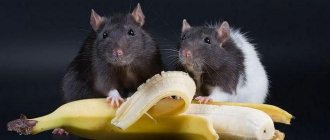- home
- Rat
- Nutrition
08/06/2019 Rodent breeders strive to diversify the diet of their charges in every possible way and add treats and treats to the diet. But can everything be used as a treat for your pet? This article is designed to help pet owners answer one of these questions and tell them whether rats can have eggs or not.
What should be included in a rat's diet?
Feed and grain are the basis of nutrition
Special rat food is the basis of pet nutrition. It can not only be purchased at a pet store and from various manufacturers, but also made from grains. Store-bought food is more popular than its homemade counterpart: you don’t need to prepare it, calculate proportions, or look for ingredients. However, there are situations in which you cannot do without a grain mixture - the pet is allergic to store-bought mixtures, the composition is not “pure”, the price is inflated by the manufacturer, etc.
From cereals and grains, rodents can be fed buckwheat, millet, pearl barley, rye and rice.
Give with caution: corn, wheat and oats due to calorie content.
Semolina, as you know, is neither beneficial nor harmful, so you can find better cereals to replace it.
Vegetables and fruits as complementary foods
If your rat is prone to obesity and you are monitoring his weight gain, then vegetables, fruits and greens will not harm his figure in any way due to their low calorie content. It is also no secret that this is a source of essential vitamins, minerals and fiber.
But the absence of this complementary food can be just as dangerous as its excess - it can lead to illness, problems with the gastrointestinal tract and poor health of the animal in general. Do not forget that complementary foods cannot replace or serve as the main part of the diet.
Remember! When introducing any product (be it vegetables, fruits, grains or protein) into the diet, you should limit yourself to a small portion to check for allergies in your pet.
Vegetables and greens as a healthy food supplement
Among vegetables, rats can safely be given zucchini, carrots, cucumbers, parsley, celery, lettuce, pumpkin, dill and zucchini.
In small quantities: eggplants (not raw), broccoli, potatoes (exclusively boiled), onions, bell peppers, beets, tomatoes, garlic.
Absolutely no: legumes, cabbage, rhubarb, radishes, radishes, turnips and beans, as all these products can greatly increase gas production in a pet rat.
Fruits and berries are healthy treats for rats
You need to remember that citrus fruits should not be given to rodents due to increased acidity, which can negatively affect the stomach of your tailed friend.
In moderation you can give: apples, peaches and apricots, currants, hawthorn (but remember that it lowers blood pressure).
With extreme caution: bananas (for rats not prone to obesity), dried fruits, pears, kiwi (due to acidity), plums, grapes.
Indications
At the moment, an ointment has appeared that helps to cope with a large list of diseases classified as chronic by official medicine. Some people believe, others do not believe in the miracle ointment from Valentina Seimova. There is intense debate about its healing properties. However, having started using it, everyone is convinced that Seimova’s ointment helps with:
- burns;
- ulcers;
- abscesses;
- diseases of the genitourinary system;
- mastitis;
- sinusitis and frontal sinusitis;
- gout;
- sore throat.
This is a folk remedy that has come to us from the depths of centuries and has been tested on more than one generation of people. It became a bestseller. Although the recipe is very simple and anyone can make Valentina Seimova’s ointment on their own.
Animal protein as complementary food for the development of the body
For the harmonious growth and development of domestic rats, it is necessary to maintain the proportions of products of both plant origin and animal origin in sufficient quantities.
Animal protein for rats can be:
- boiled fish or meat (except pork)
- chicken and quail eggs
- seafood
- baby meat food
- food for cats/dogs of premium class and higher
Adult rats need protein 1-2 times a week. Up to six months - 2-4 times a week, according to the principle: the younger the animal, the more protein it needs.
Indications
At the moment, an ointment has appeared that helps to cope with a large list of diseases classified as chronic by official medicine. Some people believe, others do not believe in the miracle ointment from Valentina Seimova. There is intense debate about its healing properties. However, having started using it, everyone is convinced that Seimova’s ointment helps with:
- burns;
- ulcers;
- abscesses;
- diseases of the genitourinary system;
- mastitis;
- sinusitis and frontal sinusitis;
- gout;
- sore throat.
This is a folk remedy that has come to us from the depths of centuries and has been tested on more than one generation of people. It became a bestseller. Although the recipe is very simple and anyone can make Valentina Seimova’s ointment on their own.
Boiled eggs in rat diet
Here we come to our topic: eggs are an excellent source of protein. With the correct use of boiled eggs in the animal’s diet, there will be no problems, given that such a delicacy will definitely be to their taste and benefit, but it is important to remember the following:
- adult rats should not be fed more than once a week;
- your pet may choke on the yolk, so it should be diluted with water;
- an allergic reaction is not uncommon, so for the first time you do not need to give the rat much, and after feeding, make sure that no spots have appeared, and the animal is active and cheerful, as always;
- eggs are high in calories and can lead to obesity, so you should not abuse them;
- domestic rats should not be fed dishes with eggs from the table, as they may contain oil, salt or spices;
- Rodents cannot eat fried foods, so treating your animal to scrambled eggs is not a good idea.
Raw eggs: is there a danger?
Thanks to wild rats (and their raids on chicken coops), there's a stereotype that raw chicken eggs are safe for pets, but the truth is that pets don't need extra protein because they already get it from their food.
In addition, they may contain worms and other parasites, which can linger in your animal’s body for a long time and lead to dire consequences. From the point of view of parasites, quail eggs are safe, since the temperature of quails is about 40 degrees and salmonellosis cannot develop. They can be given no more than once every two weeks with a serving of no more than a teaspoon.
Fermented milk products for stable digestion
Fermented milk products can harm your tailed friend only if the pet has individual lactose intolerance. It is rare, but still, when you try to give milk for the first time, you should not overuse it, as the consequences may include intestinal upset, severe diarrhea, etc. If an allergy is detected, your pet can be treated to lactose-free foods.
What can you give from dairy products?
If there is no allergy, foods without additives (dyes, berries, etc.) with a small percentage of fat content (but not low-fat) should be given.
Therefore, without flavoring additives, your pet can be treated to natural yogurt, kefir, fermented baked milk and cottage cheese, but in small quantities.
Due to the fat content and too high calorie content, you cannot: cheese, sour cream, cream, dried milk (regular milk - with caution)
Peculiarities
The egg yolk makes up about 48% of the egg's weight, about 50% is the white.
A small part of the mass is the shell. The entire burden of forming calories falls on the yolk; it is 3 times more caloric than protein. Therefore, when preparing diets for weight loss or fitness, they try to exclude the yolk from the diet as much as possible. There are discussions in the consumer community about the increase in cholesterol in the body when eating eggs. This is possible if you significantly exceed the daily dose. It should be remembered that the yolk, in addition to conditionally harmful cholesterol (for men, it serves as the basis for the creation of testosterone), contains lecithin, which is an anti-sclerotic factor. Its content in the yolk significantly exceeds the amount of cholesterol. Therefore, the risk of a sharp jump in blood cholesterol levels is compensated by lecithin.
General characteristics and principle of action on insects
Boric acid has the chemical formula H3BO3, which everyone studies in school in chemistry lessons. This substance has weak acidic properties. Boric acid is a powder in the form of small white crystals, odorless and tasteless. Slightly soluble in cold water and highly soluble in hot water. In nature, this substance is found in the form of a mineral - sassolin, mineral waters and geysers, as well as hot springs.
Boric acid has been widely used by humans: from nuclear reactors to disinfectants. Boric acid is also used as an effective folk remedy against cockroaches, which belongs to hazard class III.
Ultrasonic repeller
Such devices are sold in any hardware store and are one of the most humane ways to control rodents. The device produces sound waves that are not detected by the human ear, but cause panic and anxiety in rodents, and they urgently leave the room. To select an effective rat repeller, professionals advise paying attention to the following details:
- Power. When choosing a device, take into account the range of action. Scene. Ultrasound only travels indoors. Safety. The device must operate in the absence of people. Change of vibrations. To scare away rats, the oscillation frequency changes automatically so that they do not get used to it.
Destruction of chicken eggs by rodents
Can rats steal eggs from a chicken coop? It turns out they can, and they even have several ways. They act:
- One at a time - they take the egg with two front paws, and move with the help of their hind paws, crawling. In twos, one grabs the prey and turns over on its back, while the other drags it by the tail to a secluded place.
It is noted that rats store stolen goods in a certain place and feast on them when the product goes rotten. Now you know how rats steal eggs and ruin their owner. Moreover, these animals move not only on the floor, but also on the walls and ceiling.
Cat or dog as chicken coop protector
Often, many owners of private households keep a cat on their property, but do not allow it into the chicken coop for fear that it will crush the hens or chickens. As a result, the most reliable and effective rat catcher remains out of work, and his owner has to rack his brains about how to deal with rats in the chicken coop.
In fact, cats almost never strangle poultry. Not only chicken owners, but often even pigeon keepers allow their pets to freely enter the dovecotes and catch mice and rats here. In rare cases, when a cat does strangle a chicken, punishing it once is enough to ensure that it does not repeat this in the future.
Therefore, if there is a cat living on the property that has already proven itself as a rat catcher, it makes sense to let it into the chicken coop to hunt for rats. It’s possible that you won’t have to do anything else to get rid of the pests.
Likewise, fox terriers or Jagd terriers happily hunt rats. True, they are less inclined to wait for hours for prey, sitting in a chicken coop, but often these dogs also help their owners get rid of rats without the use of additional methods and means.
General characteristics and principle of action on insects
Boric acid has the chemical formula H3BO3, which everyone studies in school in chemistry lessons. This substance has weak acidic properties. Boric acid is a powder in the form of small white crystals, odorless and tasteless. Slightly soluble in cold water and highly soluble in hot water. In nature, this substance is found in the form of a mineral - sassolin, mineral waters and geysers, as well as hot springs.
Boric acid has been widely used by humans: from nuclear reactors to disinfectants. Boric acid is also used as an effective folk remedy against cockroaches, which belongs to hazard class III.
It is used as a basis for preparing insect poison or used in its pure form.
Mechanical methods of struggle
Can rats steal eggs? Yes, they can and do come up with clever ways. The owner of the chicken coop can suffer significant damage, so it is imperative to fight them. For this purpose, mechanical traps are used, inside which bait is placed.
They are installed in places inaccessible to hens and chicks so that they are not caught instead of rodents. And cunning rats can bypass them. Glue traps are often used, which are ineffective for strong adults that can tear their paws off the smeared surface. Another drawback: the rodent remains alive and must be destroyed or released by someone.











